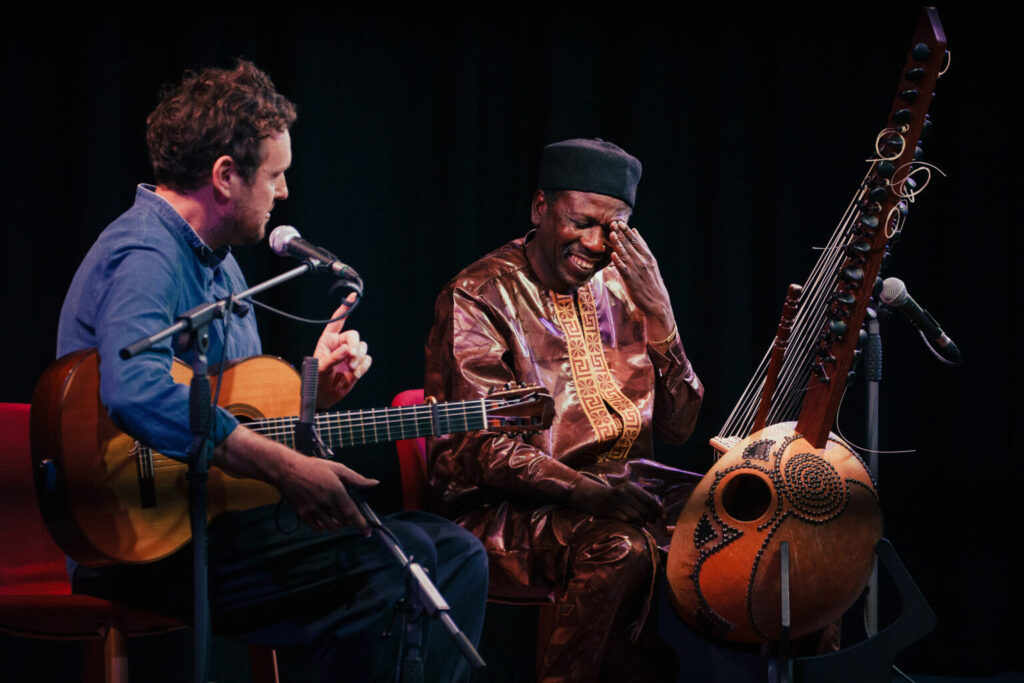Music Before 1800 explores the kora tradition of Mali

The sight of an audience swaying to the music and tapping time to the beat is routine at pop concerts, but not at Music Before 1800 performances. Then again, artists such as Ballaké Sissoko and Derek Gripper don’t really fit the early music mold. The instruments which they play, the kora and classical guitar respectively, are ancient, but the music which transfixed the audience on Sunday afternoon at Corpus Christi Church was as modern as it was timeless.
In introducing the concert entitled “Mali Before 1800,” artistic director Bill Barclay acknowledged that the concert was a break from tradition. The much-treasured early music presenter, he explained, is expanding beyond the niche of offering Western classic music from the Medieval to the Classical on period instruments.
Music Before 1800 has dubbed the current season, “The French Touch,” in which the legacy of France’s colonial era is being explored through music. Mali has a storied past—in the 14th century it was the wealthiest country in Africa and a center of Islam. In 1892, however, it fell under French colonial becoming part of French Sudan, obtaining its independence in 1960.
The real role which the French played in indigenous Malian culture was in the popularization of the kora in the 1970s. It was then that French monks at the Benedictine monastery of Keur Mousssa embraced the instrument and developed a system of notation for it. This led to the composition of works for solo kora, as well as in ensembles with Western instruments.
The kora is a West African instrument built from a gourd covered with cow skin with 21 strings, each of which plays a different note. Its sound, which resembles that of a harp, is traditionally produced by plucking polyrhythmic patters with both hands. There are mentions of harp-like instruments in West Africa as early as the 13th century, but most likely the kora dates from the sixteenth century.
Ballaké Sissoko is descended from a line of hereditary musicians, knows as “jeli”, “jali,” or “griot.” Men who passed their musical skills from one generation to another. His father, Djelimady Sissoko, who was born in Gambia, was a renowned kora player.
Derek Gripper is a composer and guitarist from the Western Cape of South Africa. In 2012, Gripper began to make arrangements of the Malian kora player Toumani Diabaté’s music. His father, Sidiki Diabaté, recorded the first-ever kora album in 1970.
The concert had none of the trappings of a classical music performance. There were no programs and neither Sissoko nor Gripper spoke of themselves or the music which they performed. Their approach is in part dictated by the fact that they don’t share a common language. Whether in a recording studio or in concert, they simply make music.
Gripper has dubbed the music they make as a “memetic improvisation”, derived from their shared knowledge of Mali’s culture and terrain. Although it is spontaneous by nature, Gripper writes in the program that the music adheres to a form not so different from that of a dance suite or sonata.
At the start, the player awakens the sleeping instrument in the nyininkar, before settling into a repeated rhythmic pattern known as kumbengo. It then evolves into an improvised melody or solo called birimintingo over the kumbengo. Traditionally, this music was played on the kora, but Sissoko and Gripper have turned into an extraordinary aural experience by combining the sounds of their instruments.
The music which they played together emerged as a gentle dialogue with melody and rhythm switching between them spontaneously. The sounds which they produced were soft, scintillating, and constantly evolving in a state of perpetual motion. The slightest change in tempo or dynamic served to intensify the experience.
Each played a solo number. Sissoko demonstrated the variety and breadth of sounds which could be conjured from his instrument. After a few measure which sounded of Bach, Gripper combined classical guitar style with his take on kora technique. They were equally adept at drawing the complex sonorities and textures of West African music from their instruments individually, as they were when playing together.
Music Before 1800 continues with Constantinople & Accademia del Piacere on April 14. mb1800.org